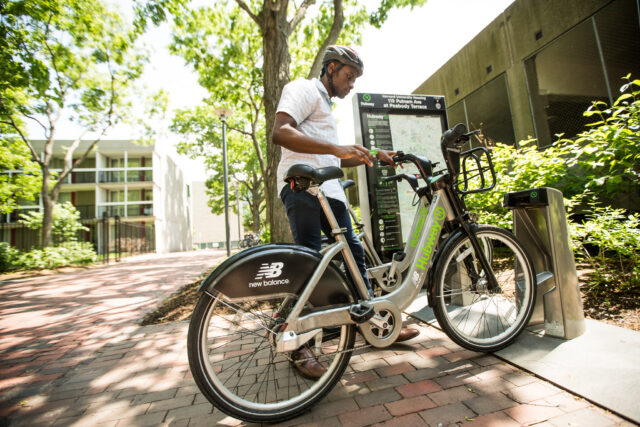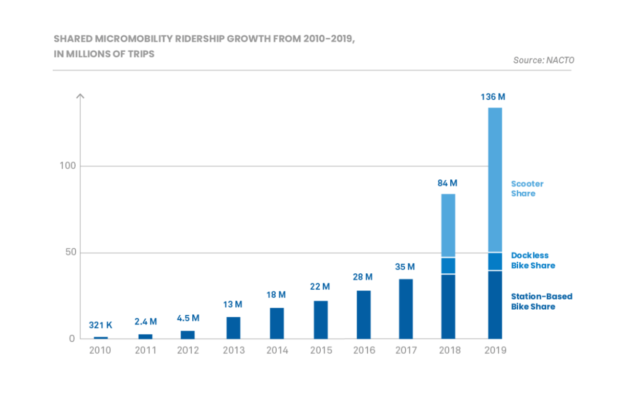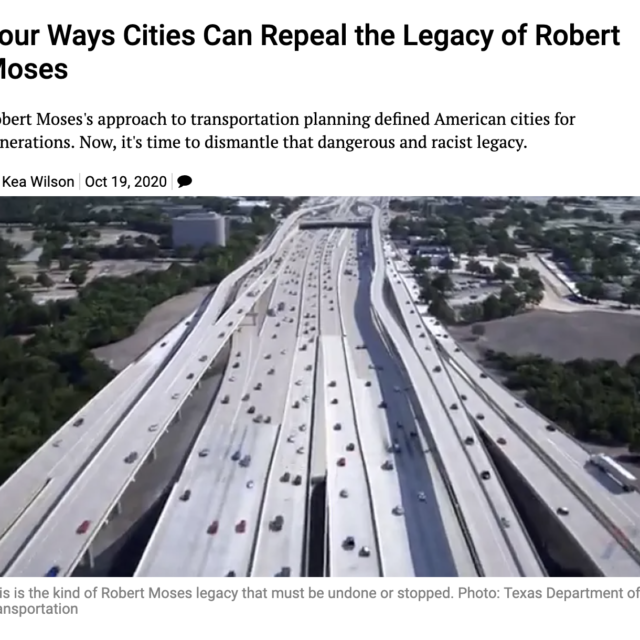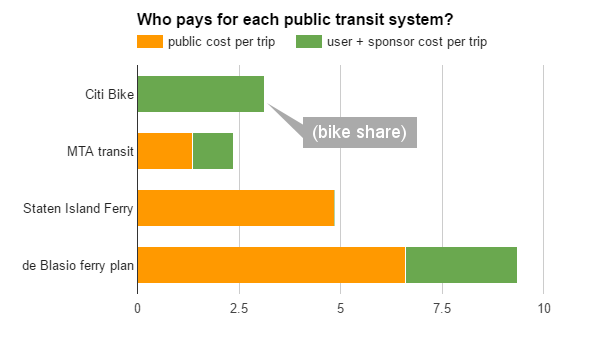Transportation Bills to Get Excited About
by Kiran Herbert, Communications Manager
February 9, 2021
Here’s what policy proposals are on the radar of U.S. active transportation advocates—and how they could affect bike share.

A man approaches a bike share station in Cambridge, Massachusetts. (Credit: Green Lane Project)
The new Biden administration has had a busy couple of weeks, wasting no time in rolling back Trump era policies on immigration and climate and appointing a diverse and competent cabinet. Among the new hires are Secretary of Transportation Pete Buttigieg and Deputy Secretary Polly Trottenberg, as well as active transportation advocate Stephanie Pollack as deputy administrator of the Federal Highway Administration (FHWA).
As these announcements were being made, Rep. Earl Blumenauer (D-OR) reintroduced two bills co-led with House colleagues Ayanna Pressley (D-MA) and Vernon Buchanan (R-FL). The bills, which passed the House last July, would expand bike share nationwide and provide tax breaks for bike commuters respectively. Paired with a (slim) majority in Congress, it finally feels like pro-micromobility policy—especially as a way to lower carbon emissions—finally stands a chance of getting signed into law.
Also introduced last month was the Economic Justice Act, brought by Senate Majority Leader Chuck Schumer. If passed, the bill would provide billions in federal funding for cities wanting to demolish urban highways, as well as plan, design, construct or improve pedestrian walkways or bicycle lanes. Below, we lay out the gist of each bill, as well as its implications for bike share.
The Bikeshare Transit Act
The most obvious boon for bike share would be this act, which would codify the term “bikeshare” in federal code. That would make it eligible to receive U.S. Department of Transportation (USDOT) funding, which could be used to construct and maintain bike share facilities (currently, USDOT uses its discretion when it comes to funding bike share programs). The hope is that the act would open up funds from carbon emissions reduction initiatives, such as the Congestion Mitigation and Air Quality Improvement Program (CMAQ), which currently supports carsharing but not micromobility solutions like bike and scooter share.
As Streetsblog highlights, bike and scooter share are relatively new concepts in the U.S. but ridership has taken off in the last ten years, all without much of anything in the way of federal assistance. While ridership has risen, however, bike share systems have shrunk—some systems ran out of money before truly getting off the ground, while others had trouble obtaining city funding or private investments. This bill would provide federal assistance, which experts agree would boost micromobility systems, and thus bicycling, nationwide.
Plus, a move away from private funding—which is driven by scalable profit models and isn’t necessarily incentivized to operate in historically marginalized neighborhoods—to federal funding could lead to increased access to shared micromobility systems in low-income and BIPOC communities. But will the act pass? Advocates are hopeful it will go through in the Democrats’ forthcoming infrastructure package.

There’s been an explosion in U.S. micromoblity use over the last decade. (Credit: NACTO)
The Bicycle Commuter Act
Reps. Blumenauer, Buchanan and Pressley paired this act with the Bikeshare Transit Act. If you’re experiencing déjà vu, that’s because bicycle commuter benefits were already a thing prior to the Trump administration suspending them in 2018 through 2026. Since then, the bill has gotten a revamp and is the better for it. The Bicycle Commuter Act would provide nearly $1000 a year in pretax commuter benefits and those benefits can also be used to offset costs associated with electric bicycles or e-bike specific maintenance. Although the bill doesn’t include scooter share, this is a win for anyone who hopes to commute to work by bike share.
The Economic Justice Act
The name of this Senate bill alone is something worth celebrating, as it acknowledges a national history of systematic racism, as well as the persistent underinvestment in low-income areas and neighborhoods of color. Those same populations were the most affected by urban highways, which for decades razed and divided communities in the name of high-speed thoroughfares. Part of the new bill would include $10 billion in funding as part of a pilot program that seeks to reverse this infrastructure norm by funding the removal of urban highways and the equitable redevelopment of reclaimed land.
This Bloomberg article does a fantastic job of diving into the issues the program might pose and what’s necessary for it to succeed. Under the act’s Safer Healthier Streets program, grants would also be available for the “construction or installation of enhancements to pedestrian walkways, bicycle lanes, or shared-use paths, including…bike rack [and] bike share stations.” In order to get funding, all new projects would have to prioritize equity and facilitate community engagement, forcing cities to reevaluate what just transportation infrastructure means for them.
Demanding Parity
These bills are making headlines as active transportation push to revamp the way we fund highways and public transit. Since 1982, federal transportation funding has been split 80-20, prioritizing highways, which get 80% of funds, versus public transit systems, which get 20% (in reality, however, transit often doesn’t even get that). A diverse coalition of community activists has begun lobbying Congress to bring parity, or a 50-50 split, to our outdated division of transportation dollars.
According to panelists on this Federal Mobility Policy Update, if we could achieve parity, there would be “enough funding to provide decent transit service in every city across America of 100,000 people or more.” Parity would represent a rebirth for public transit and it could have huge implications for micromobility.
Although change seems imminent, much remains to be seen in the coming months. One thing’s for sure though: To “Build Back Better,” as the Biden campaign promised to do, we need to completely rethink our federal approach to transit.
The Better Bike Share Partnership is funded by The JPB Foundation as a collaborative between the City of Philadelphia, theNational Association of City Transportation Officials (NACTO) and the PeopleForBikes Foundation to build equitable and replicable bike share systems. Follow us on Facebook, Twitter and Instagram or sign up for our weekly newsletter. Got a question or a story idea? Email kiran@peopleforbikes.org.



